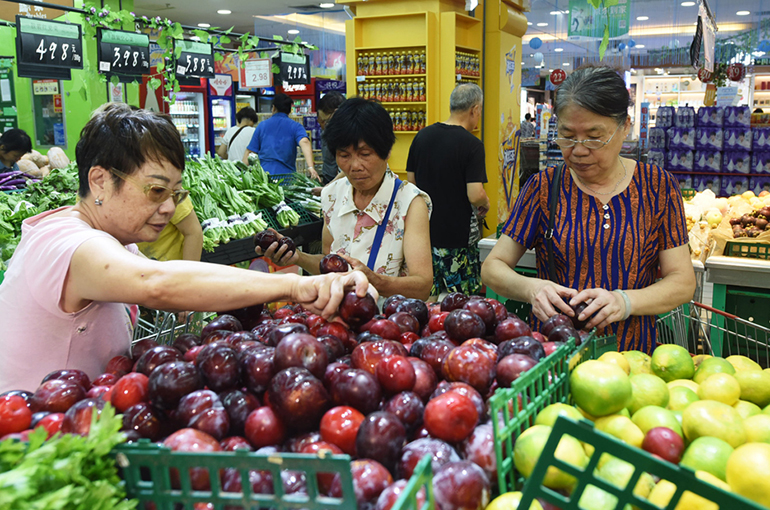 China’s Consumer Inflation Stays Flat in June, Producer Prices Slow to Seven-Year Low
China’s Consumer Inflation Stays Flat in June, Producer Prices Slow to Seven-Year Low(Yicai Global) July 10 -- China’s consumer price index, a gauge of consumer inflation, remained the same in June as a year ago, as the price of pork continues to slide while that of fresh produce and poultry keep climbing. But the producer price index, a measure of industrial profits, sank to the biggest contraction in seven years on weak demand, according to the latest data.
Last month, the CPI did not change from June 2022, although it dipped 0.2 percent from the previous month, according to figures released by the National Bureau of Statistics today. But the PPI sank 5.4 percent year on year, a much greater drop than May’s 4.6 percent, and the biggest fall in seven years.
Food prices gained by 2.3 percent year on year and non-food prices slumped 0.6 percent. The core CPI, which excludes food and energy prices, edged up 0.4 percent in June from a year ago, a drop of 0.2 percentage point from the previous month.
Faltering consumer inflation has to do with a drop in pork and industrial consumer prices but only a slight increase in the price of services, Pang Ming, chief economist at commercial real estate services firm Jones Lang LaSalle's China arm, told Yicai Global.
The CPI in the third quarter may continue to be affected by pork prices, he added.
Demand for services is still recovering, but it is not yet back to previous levels as people are still careful about spending on services, and this restricts the growth of prices, said Wu Chaoming, vice president of think tank the Financial Information Research Institute.
The dive in the PPI not only has to do with the persistent fall in commodity prices and last year’s high base line, but also reflects weak activity in the real estate and construction sectors, Pang said. However, the PPI should start to improve in the second half, he added.
The recovery of industrial demand and consumer spending is sluggish, Pang said. The effect of policies to stabilize market confidence, spur growth and boost demand should be closely watched, he added.
The PPI's widening fall is putting greater pressure on businesses and affecting their efficiency, the NBS said. The focus should shift to boosting demand so as to help manufacturing reach a higher level of dynamic balance, drive the price of factory products back to a reasonable level and support the stable and healthy development of industries.
Editor: Kim Taylor